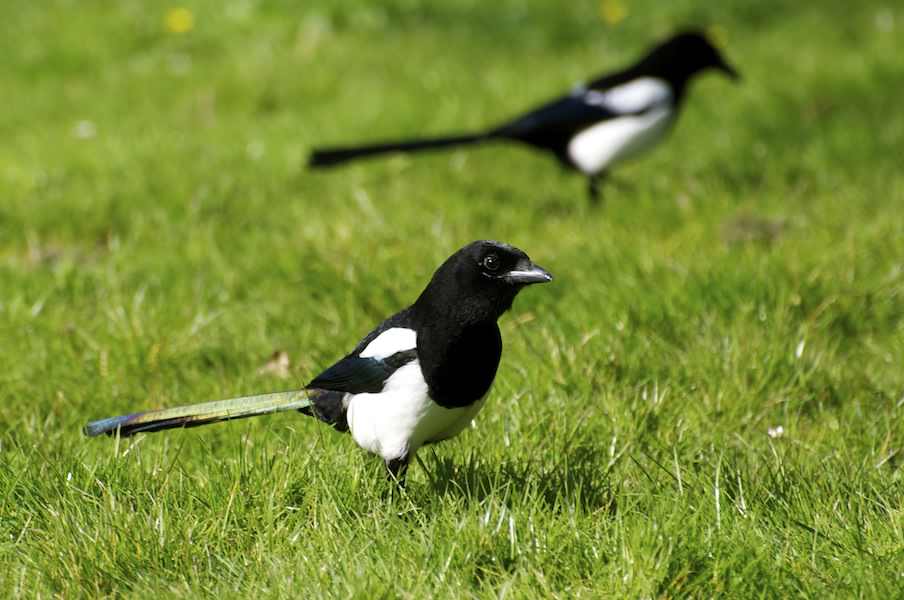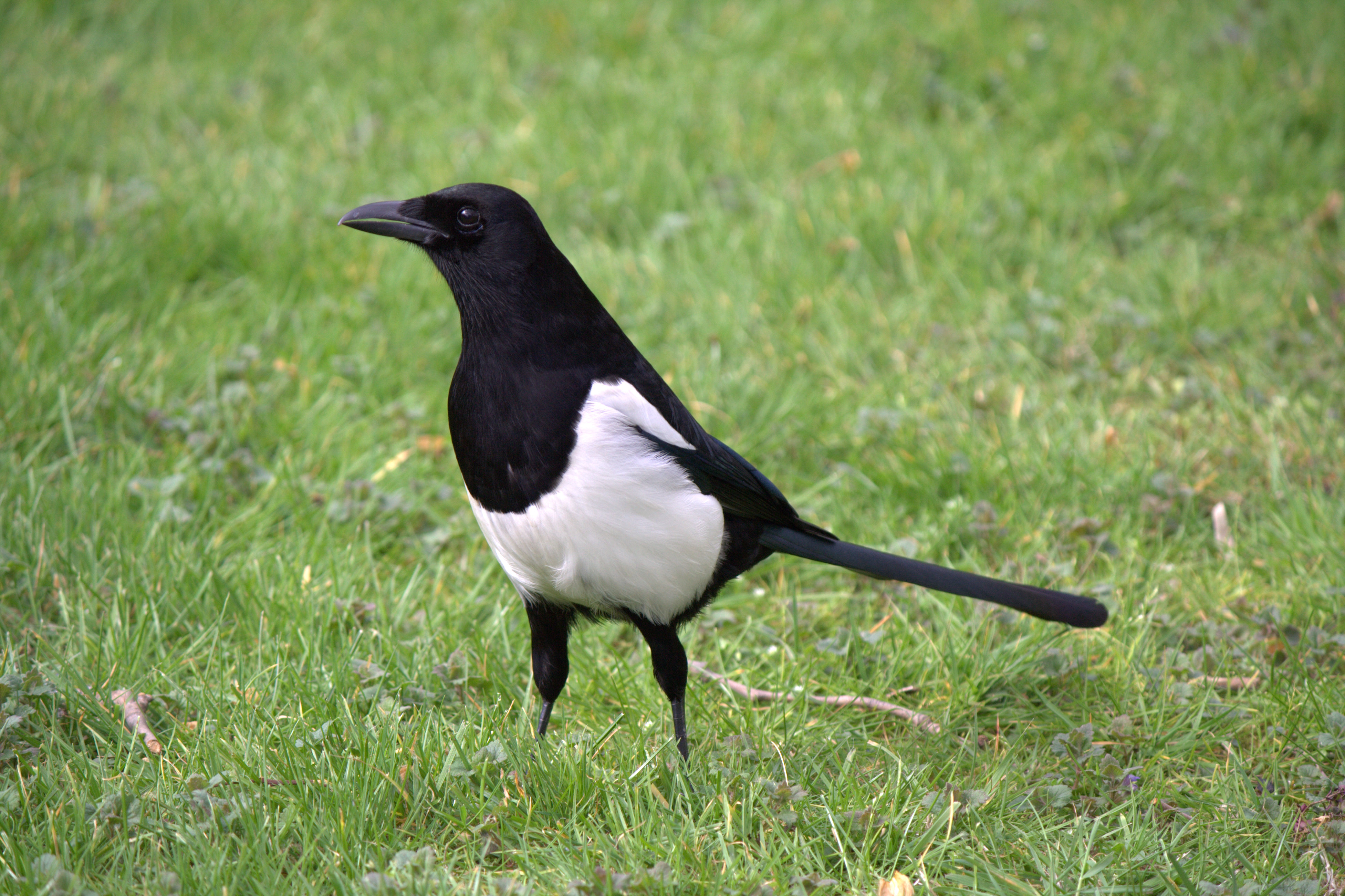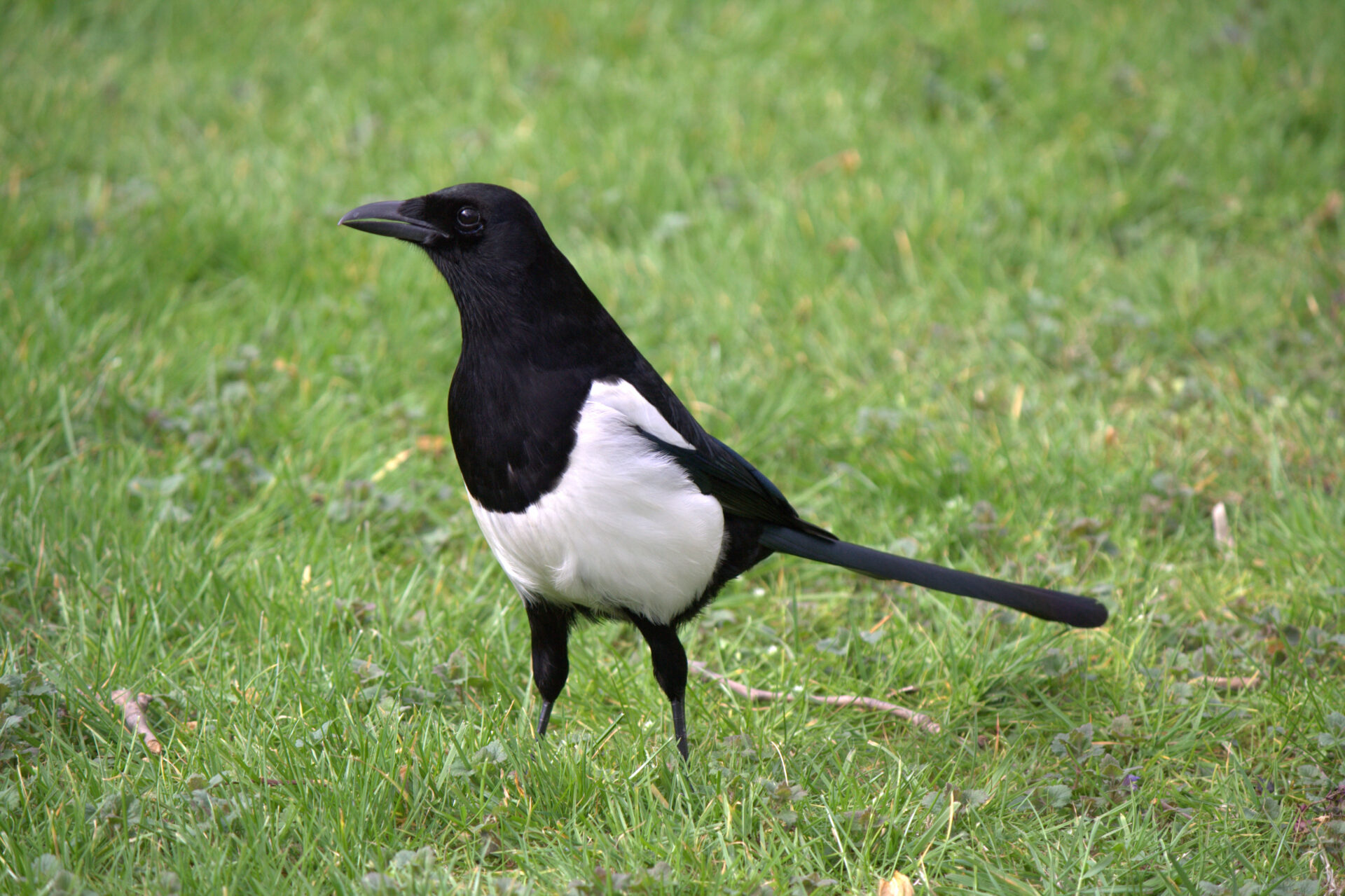My mum loves to play an English band called ‘The Unthanks’ in the car and at home, my favourite song by them is a wonderful folk song called ‘Magpie’. Of course it is, it’s about a bird! I think it’s wonderful to hear someone singing about this beautiful bird. I know you might think I’m bonkers, a magpie, beautiful? Well, I think so. Its bright blue flashes of feather, its imposing size, striking pose and its cackling call all entrance me. They evoke my love of storytelling, history and superstitions (they are very interesting). No other bird stirs up opinion more than the magpie and yesterday and today, I did a little research to share on todays blogpost.
The magpie (Pica pica) belong to the family of Corvidae, which include crows, ravens, jackdaws and jays. They are some of the most intelligent animals in the world. They are opportunist predators and are omnivores, eating pretty much everything in springtime (to feed their young) and seeds (from our garden anyway) and ground invertebrates. They do raid nests of songbird chicks and eggs during the season and this means that magpies are often seen in a negative light. However, it is general consensus among researchers that magpies have no negative effect on numbers, you can probably blame cats more than our black and white avian friends . They mate for life and they stay pretty much in the same place (within 10k) all their lives.

Magpies are steeped in history and superstition and the song which I mentioned incorporates the poem ‘One for sorrow. Two for joy…..’ Some people may tip their hat to a magpie, wish him/her good morning and in Elizabethan times chant ‘devil, devil, I defy thee’ (also in the Magpie song). I can’t think of any other bird we do this for, if you know, please share the stories with me! People do this of course to avoid the bad luck that magpies are said to bring, particularly in singular form. When we see a group of magpies, we inwardly sigh with relief and maybe if you’re expecting a baby, you might put some value on the amount you see, ‘three for a girl, four for a boy’. I found that some cultures actually view the magpie in an opposite light. In China and South Korea, they are said to bring good luck, happiness and good fortune. Also, when I was researching, I found an article about an animal behaviourist called Dr Bekoff from The University of Colorado witnessed ‘funeral’ behaviour in magpies! He observed four birds, lovingly lay grass beside the corpse of a dead magpie, gently peck their lifeless body and almost look as if they were standing in vigil. Astonishing behaviour from a bird which is viewed with distrust and annoyance.
We have a pair of magpies who visit our garden every day, eat seed from the ground and grace us with their call and their presence. This bird, so present in culture and literature is a welcome guest and we always stop to watch their beauty in the sunlight or brightening up a dull dismal, rainy day. Thank you Magpie!

Below is a video of The Unthanks singing ‘Magpie’. I hope you enjoy it and that you enjoyed reading a little about this beautiful bird. If you know other facts or information about magpies, I’d love to know.
Dara


12 Responses
Growing up I was somewhat leery of magpies as my mother used to tell me that if I wore anything “shiny or metallic ” a magpie would come and grab it away from me!
I wonder where the name origin “magpie “comes from?
Hi Kerry, the word magpie comes from maggot pie – from Elizabethsn times I think. I need to read more on this. Magpies are great pest controllers too and it’s a myth about the shiny stuff, they are just very curious I think. Thank you. Dara
I loved this post and I love magpies. But it’s a relatively recent love affair, after being a little traumatised in my younger years by territorial dive-bombers protecting their nests! We have a couple that come back to the eaves of our house every August (just before our spring). That time of year and for the next month or two, they warble all through the night. I was overseas last spring, and my husband, back in Australia, sent me a recording of the maggies warbling at 3am. It made me so homesick! There is a website and Facebook page you might like: it’s called The Magpie Whisperer, and it features the crazy magpies that hang around the owner’s backyard, along with recordings of the lovely magpie song. Another thing I love is an Instagram account called Penguin the Magpie. It’s a series of photographs that tell the story about a magpie called Penguin that the photographer’s family adopted. The magpie is free to come and go, and when she’s home with the family, she REALLY makes herself at home! If you decide to have a look, start at the oldest pictures and work forwards from there – they’re amazing! (BTW magpies are great mimics, and can be taught to “talk” like parrots can. In fact, I had a friend whose home was protected by their pet magpie. He’d learned to mimic my friend’s wife when she called him: “Harold! HAROOOOOOOLD!” It was exactly like her, and the magpie would holler this whenever it was excited or got a fright. Anyway, one time they were out, and a thief broke the glass at the front door, and the magpie called out, “Harold! HAROOOOOOOLD!” and that was the end of the break-in!)
Thank you so much, Vibey. That was very interesting, I’ll look up those sites later. Thank you ☺️
After typing all of that I believe our magpies might be different to yours, but love them all the same! 🙂
Yes, I knew that but they are still from the same family and I really enjoyed reading more about them! Thank you. Dara
wow
Thank you for the lovely article! I enjoy watching magpies, too! The German word for magpie is “Elster”, and the etymology is said to be: from the middlehighgerman (10. century) word “agelster/egelster” which comes from a root that means “pointy” (for the tail), related to modern french aigu or also in several languages acute… the part “ster” is related to the name of the bird “Star”, English starling… Interesting enough, the German article about Elsters in Wikipedia gives an alternative for the etymology of the English name: Mag as short for “Margaret” as a name for a chatty person, the second part -pie is from the Latin name Pica and related to (wood-)pecker, as in the French name for magpie: pie bavarde (bavarde means also chatty). They give as a source this article: http://www.etymonline.com/index.php?term=magpie
I simply love etymology, it’s always good for surprising discoveries!
That is amazing!!! That was so interesting thank you so much, I going to learn more at Etymology! I am learning German at school and I love it.
Thanks for getting in touch.
Dara
Wikipedia articles in English & German often provide information about etymology, and where they don’t, the sister project wiktionary often helps, with links to sources… Glad you enjoyed the comment, I’m looking forward to reading more of your blog and to look around in your older posts!
Great post, magpies are one of my favourite birds ❤ I love all of the corvids.
Yay! Thank you ????